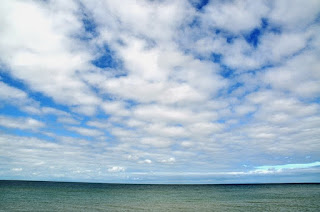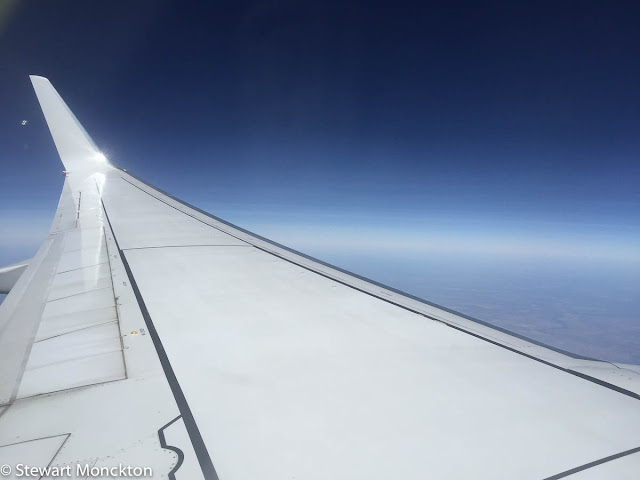Change while the nation stops
 It’s the perfect traffic storm, and once more, at the start of a long weekend, I’m stuck right in the middle of it. Red taillights. Rainbow car colours. Jaguars. Silver top taxis. The speedo needle becomes a weather vein of discontent. I Play some new music but it leaves me Cold. Some song about Pandas, Pandas, Pppaaaaanandas. It rains heavily. When we do move the spray is thick. What lies beyond my own bonnet is speculative. I change discs for the Archangel. And the Red Rain is coming down, coming down all over me. Later a car cuts through the traffic left and right, fish tails, straightens and drives on. I slow even more and think about braking distances, lack of traction and the occasional failure of natural selection. I try not to embrace the collective drop in IQ that heavy rain brings on in drivers. A journey of 90 minutes takes three hours. I arrive tired. But I do arrive. It keeps raining.
It’s the perfect traffic storm, and once more, at the start of a long weekend, I’m stuck right in the middle of it. Red taillights. Rainbow car colours. Jaguars. Silver top taxis. The speedo needle becomes a weather vein of discontent. I Play some new music but it leaves me Cold. Some song about Pandas, Pandas, Pppaaaaanandas. It rains heavily. When we do move the spray is thick. What lies beyond my own bonnet is speculative. I change discs for the Archangel. And the Red Rain is coming down, coming down all over me. Later a car cuts through the traffic left and right, fish tails, straightens and drives on. I slow even more and think about braking distances, lack of traction and the occasional failure of natural selection. I try not to embrace the collective drop in IQ that heavy rain brings on in drivers. A journey of 90 minutes takes three hours. I arrive tired. But I do arrive. It keeps raining.Was it a bad journey or a normal journey on a bad night? Is this a rainy night or am I so used to dry ones that I have forgotten the reality of a wet road? How can we see what is change and what is normal? I’ve seen more rain in the last two years than in the other 13 I’ve lived in Australia. For me normal is dry and raining is different. Walking home in drenching rain a novelty, walking home drenched in sweat much more normal. I think about these things as I go
to sleep.



I wake to the normal / abnormal sound of rain on the roof and the sight of heavy grey skies. I start thinking again. How do we keep track of change in the natural world? Not the day to day changes of weather or the slow change of seasons, but the longer change of climate and growth. Can you really watch a place turn from grass to trees? Or does it happen suddenly in your mind when you realise a meadow is now a forest? Is this part of the problem when people talk of climate change, that our brains are not wired to see change over this time scale?
For most of the history of humanity I’d already be dead. The three score years and ten is a modern invention and to live beyond that age is an issue only of the current day. But our brains seem not to know this. In another time I would have in all probability died in childhood – vast numbers of people did. An early death and a youthful old age must have been common. And if you don’t live for more than 30 years how could the brain evolve to cope with changes that take place over dozens of decades or hundreds of years. Maybe we should ask the trees what they think – and if we look at their rings they can tell us what they know in the language of growth. Maybe we should ask the trees that felt the touch of animals now long gone and stood as watchers as the world turned and turned and turned.

When the rain stops we go for a walk around the point to the lighthouse. A walk only possible because of the turn of the tide. That’s a change you can understand. On the cliffs a huge slab of rock hugs the stones below it. Last week it started its journey down to the beach. But how long will it have to be there before people forget that it was not ever thus? Will it get a name – the table – and be visited for year after year by the same people? How long before the cliffs again take on the myth of permanence as they creep day by day inland? The rocks are old in a way we cannot really know and even if we can name the age does it really mean anything? Does five million years old really mean something different to just “old”? The rocks have been carved by the long slow hands of the sea and wind. Shapes form where none were before, and if chance shapes them in a way we like, they will be named. And somehow we think that naming will fix them. It becomes news worthy if they fall or change, but we forget that they were made because of change and that they will fall in the same way.
The beach below the cliffs seems to have less sand than normal and the city shapes of rocks poke through. Limpets clamp on to small depressions and lines in the rock. Tiny blue grey snails gather in lines where ancient changes made the rock weak and present a shadow of protection. Each wave brings in a small fleck of change. Change upon change upon change. Chance upon chance upon chance until we reach today and then we can look back on the winding path that brought us here.



Beyond the lighthouse the ruins of a war bunker look out to sea. Built to defend against a threat that never came to this coast. Build by a generation who must have thought it normal to go to war as their fathers and grandfathers had done. My kids corrupt its purpose and invite us in for tea and cakes. As I feed on their imagination I wonder what would have happened if a steel grey armada had sailed over the horizon and come here to wage war. In places like this the shadow of history seems much longer than normal. A sail boat passes where the battleships never came and I turn back to my kids as they offer me more tea and more cakes.


 Back at the beach the gulls gather at the tide wash and search for dinner, the small waves turning over sand, revealing food. Squabbles break out over choice morsels found by the lucky or overlooked by the angry. On a fence a pair keeps watch for any change of chance. Looking one way, then another, then at each other. The necessary vigil of the chancer. Off shore a sunken boat, the Ozone, breaks down through the familiar alchemy of sun and salt and sea. It was sunk to provide protection from the forces of change, but now it’s all but overwhelmed. I plan to return in the summer for a closer look.
Back at the beach the gulls gather at the tide wash and search for dinner, the small waves turning over sand, revealing food. Squabbles break out over choice morsels found by the lucky or overlooked by the angry. On a fence a pair keeps watch for any change of chance. Looking one way, then another, then at each other. The necessary vigil of the chancer. Off shore a sunken boat, the Ozone, breaks down through the familiar alchemy of sun and salt and sea. It was sunk to provide protection from the forces of change, but now it’s all but overwhelmed. I plan to return in the summer for a closer look.The kids play on the beach, larger than last year with more words. They can both read, they can both swim. The kids that are here now did not exist last year. This change is wonderful and strange to watch. Would I hold back change if I could – to spend more time here and now? To regain some of the moments lost to fear and to a barking black dog? I really don’t know.
This weekend was born from the Race that Stops the Nation. But does anything really ever stop? We may come back to the same places but we and it have changed. The only constant is change. Change keeps the world as it is; without it all things would tumble down to nothing. Change is the engine of the world.



We drive away, leaving behind a fleece jumper, a toy car, a book of stories and a single pink sock. Or maybe we left some of those behind last time. Or the time before.





Comments
Wonderful photos, thanks for the walk!
Brilliant shots & thanks for sharing.
As for your musings, yes, change is the only constant! I, too, wonder about all the climate change and our way of measuring it. I am sure that the things we do to this earth have an affect on it, but I also think that even a span of 1000 years is small in geologic time. All this change is hard to get use to and even harder as one grows older. Perhaps that is why we die--because we cannot adapt. I think our children are adapting to this new digital and computer age and many of us would be left behind if we lived long enough to see what was coming in the next 100 years. I think of how much the world has changed since my Grandmother was born, and how much it has changed since I was.
I am so used to computers now I cannot imagine living without one, yet I use to long to be a pioneer and live a simple life out on the prairie. I guess I have changed also.
I love you post - very thought provoking. The weather is certainly doing some strange things the world over just now isn't it.
Your have some wonderful pictures there also. Thanks for sharing your thoughts. :)
A quick question have you or are you thinkig of writing a book?
You have the talent for it..
By the way, I love the pictures. Especially the gulls, the flowers around they hay, and the view looking out from the bunker.